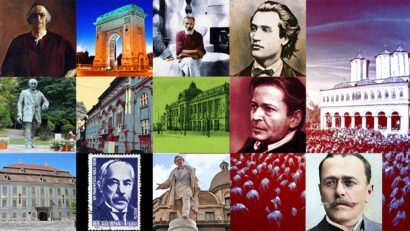The Feminist Alexandrina Cantacuzino
The profile of one of Romania's prominent feminist activists.

Christine Leșcu, 05.04.2014, 14:00
Alexandrina Cantacuzino stands out as one of the best organizers of the feminist movement in Romania, having a strong bearing on the entire feminist movement in the early 20th century. Alexandrina Cantacuzino was born in Ciocanesti village in 1881; she was the daughter of army officer Theodor Pallady and joined the old and aristocratic Cantacuzino family by marrying conservative politician Grigore Cantacuzino. Yet her own political views were not conservative at all as Stefania Mihailescu, a researcher of the history of the feminist movement in Romania explains.
” She furthered her education at the Sorbonne, then she returned to Romania, dedicating herself to charity works and activities that were particularly aimed at the education of the young girls. Back home Alexandrina Cantacuzino found here hundreds of women’s organizations pursuing that goal. A group of educated women, who believed women should have a role other than the traditional one in modern society, got themselves organized, so that the women’s elite could make a more substantial contribution to the education of ordinary people. It was to that end that Alexandrina Cantacuzino jointly with several other women from the Romanian aristocracy initiated “The National Romanian Women’s Orthodox Society.”
Under Alexandrina Cantacuzino’s presidency, the aforementioned organization undertook a series of activities that, before the First World War, mainly targeted women’s emancipation through as wide an access to education as possible. Researcher Stefania Mihailescu:
“Before World War I, the organization founded 8 high-schools, hundreds of kindergartens, school canteens and libraries for poor girls. During World War I women took over the activities of men who had gone to the front, jointly with the Red Cross implementing healthcare and social assistance projects in which women had not been involved until then.”
After the war, women wanted to get involved in finding solutions to the country’s cultural, political and social problems. But the legislation granted women no political rights and no social role. Women did not even have the right to vote. At that point, Alexandrina Cantacuzino used her influence again, organizing the feminist movement even better, just as Stefania Mihailescu says.
” In the summer of 1921 Alexandrina Cantacuzino initiated the establishment of the National Council of Romanian Women, with a view to channeling all energies towards changing women’s public status. More than 32 associations joined that council, many associations from Transylvania joining the council through the 1918 Union of Transylvania with Romania. When the new Constitution was voted in 1923, the existing paragraphs stipulating women’s lower status were not eliminated Then Alexandrina Cantacuzino suggested that the Romanian Council should be affiliated to the International Women’s Council, an organization with over 40 million members, that mainly fought for granting women the right to vote. In May 1923, she suggested that the Little Feminine Entente be set up, including women’s organizations from Poland, Czechoslovakia, Romania, Yugoslavia and Greece. Romania thus hoped to get support for women to be granted the right to vote. Alexandrina Cantacuzino was elected leader of the Little Entente.“
Alexandrina Cantacuzino had died in 1944 before the communist regime came to power in Romania. Here is Stefania Mihailescu again, this time speaking about what Alexandrina Cantacuzino managed to achieve for the Romanian women’s political emancipation.
”As a result of the persistent efforts made by the National Council of Romanian Women, in 1929 a new administration law was passed, stipulating women’ right to run for local and county elections, not all of them, but only those who had a certain social and professional status. In 1930, for the first time ever, women took part in the local elections and more than one hundred women were elected in local and county councils. And there women proved their extraordinary capacity to organize social assistance, they institutionalized it, they set up social assistance schools, they published magazines, so that all women could contribute to the change of women’ s status, at least in that respect. In 1938 the royal dictatorship was instated and the Constitution was changed again, while in 1939 a new election law was passed, based on the new Constitution. Then women were entitled to run for parliamentary elections. But that was to no avail, since back then elections were not held. It was not until 1945, when women had the right to vote, that a new dictatorial Parliament emerged, which formally recognized women’s rights, but in effect it deprived women from their right to organize, disbanding their organizations.”
All in all, the results the feminist movement in Romania obtained in the interwar period disappeared in the post-war period.






























